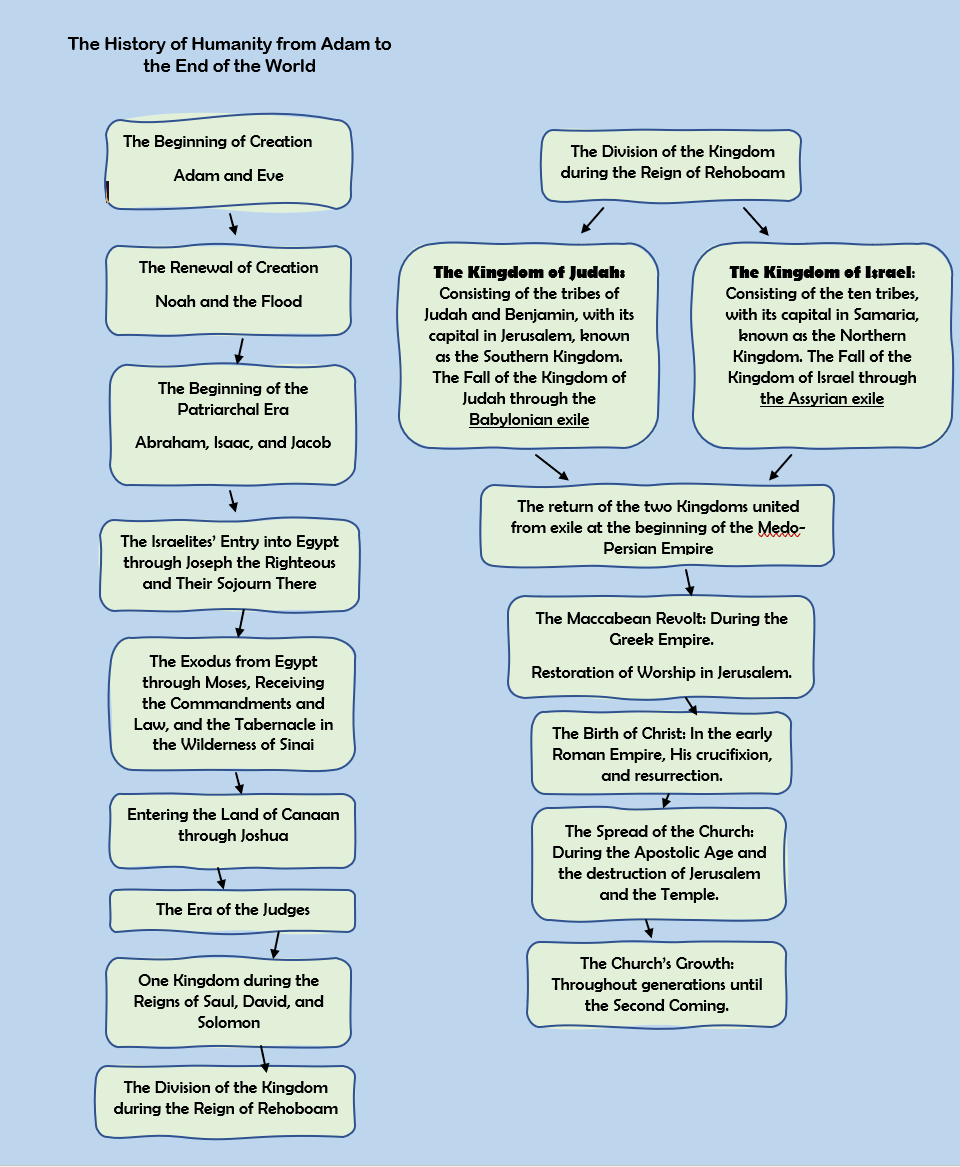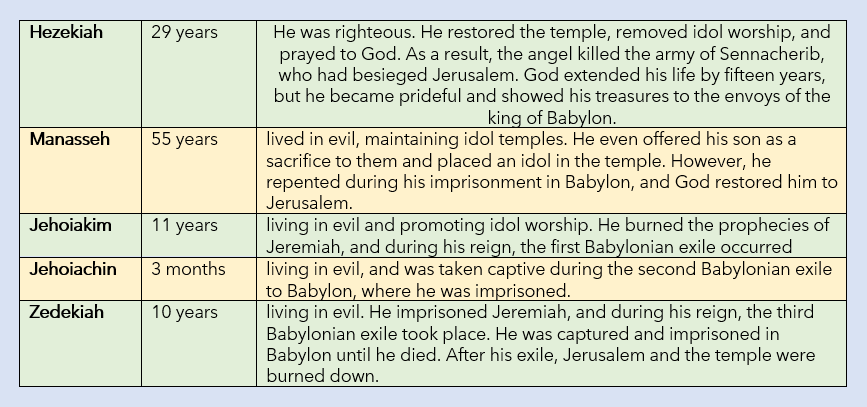Week 2: Isaiah and the Exile - Part 1
36 +37 + 38 + 39 + 40 + 2Kings 24& 25
Week 2: Isaiah and the Exile- Part 1
The History of Humanity from Adam to the End of the World
Introduction:
- Isaiah:
- Isaiah was of royal lineage, the nephew of King Amaziah. He had two sons, Shear-Jashub and Maher-Shalal-Hash-Baz, whose names symbolized exile and return from captivity. Coming from a wealthy and educated family, Isaiah prophesied for sixty years, beginning at the age of twenty and continuing through the reigns of four kings: Uzziah, Jotham, Ahaz, and Hezekiah. He was martyred at eighty years old during the reign of King Manasseh.
- The content of the four chapters (36–39) is fulfillment of previous prophecies, as everything Isaiah spoke about in his prophecies (from chapters 1–35) has now come to pass.
- The story of Sennacherib and Hezekiah begins with Sennacherib demanding tribute to avoid attacking the city, and Hezekiah paid him 300 talents of silver and 30 talents of gold. However, Sennacherib betrayed his promise and attacked Judah, taking 200,000 captives.
Date:
- Isaiah began his prophetic ministry in the year 740 B.C. and continued until the year 680 B.C., meaning he wrote for about sixty years during his prophecy. In the days of Uzziah, Jotham, Ahaz, and Hezekiah, kings of Judah.
- His ministry commences around the time the Northern kingdom is carried into captivity (722 BC ). About 140 years before the Southern kingdom went into captivity ( 586BC ).
Major Theme:
- Repent and turn back to God
- Rely on God rather than earthly powers and possessions
- Warning against outward religious appearances, as it is considered hypocrisy.
- Hope in the awaited Messiah, the Savior, and the new life in Him.
Outline:
- God the disciplinarian: (Chapters 1-35)
- A call to repentance for the kingdom of Judah, Israel, and the surrounding nations.
- King Uzziah (Chapters 1-5)
- King Jotham (Chapter 6)
- King Ahaz (Chapters 7-14)
- King Hezekiah (Chapters 15- 66)
- A call to repentance for the kingdom of Judah, Israel, and the surrounding nations.
- God the victorious (Chapters 36-39)
- Judah's victory over Assyria by God's power and the healing of king Hezekiah
- The Messiah the savior and God's promises (Chapters 40-66)
- Prophecies about the incarnation of Christ, His crucifixion, and resurrection.
Objective: Week 2 Isaiah chapter 36-39
- Isaiah and the Exile - Part 1
Resources:
- Catena Bible Commentary
- Fr. Tadros Yacoub Malaty (Book of Isaiah)
- Fr Dawoud Lamie Bible study (Arabic)
- Fr Luka Maher Bible study (Arabic)
Reading:
- Isaiah
- Chapter 36 (Verses 4-10, 16-22)
- Chapter 37 (5-7, 10-22, 33-38)
- Chapter 38 (1-9)
- Chapter 39 (1-8)
Key verse(s):
- "O Lord of hosts, God of Israel, the One who dwells between the cherubim, You are God, You alone, of all the kingdoms of the earth. You have made heaven and earth." Isaiah 37:16
Comments:
Chapter 36
- Sennacherib boasts against the Lord (Verses 4-10)
- Rabshakeh told Hezekiah that trusting in Egypt or even in God is in vain.
- The Deception of the devil (Verses 16-22)
- Rabshakeh asked the people of Judah to go with him to his land and promises to give them land like their own, but this is deception and trickery because he intended to enslave or kill them. This is always the trick of the devil: to lure the soul outside the walls of Jerusalem (i.e., outside the walls of the church) to isolate them away from God.
- Hezekiah's wisdom is clear in not arguing with Rabshakeh, and we should not engage in discussions with the devil, no matter how tempting his promises might be.
Chapter 37
- Isaiah assures deliverance (Verses 5-7)
- Isaiah reassures King Hezekiah and the people of Judah that God will deliver them from the Assyrian threat.
- Sennacherib's threats and Hezekiah's prayer (Verses 10-22)
- Sennacherib sent a letter to Hezekiah threatening to destroy Jerusalem and mocking the God of Israel.
- In response, Hezekiah prayed to God, seeking divine intervention. Hezekiah's prayer is marked by humility and faith, entrusting the situation to God’s judgment.
- The Word of the Lord concerning Sennacherib (Verses 33-38)
- God responds to Hezekiah's prayer through Isaiah, declaring that Sennacherib will not succeed against Jerusalem.
- Sennacherib returned to his own land, where he is later killed by his own sons.
Chapter 38
- Hezekiah's life extended (Verses 1-9)
- King Hezekiah became very ill and near death. However, he prayed to God, pleading for his life and recalling his faithfulness. God responded to his prayer and extended Hezekiah's life by fifteen years.
Chapter 39
- The Babylonian envoys (Verses 1-8)
- This chapter begins by referencing the Babylonian exile. After this chapter, the focus shifts to Babylon as an enemy of the people, the Babylonian captivity, and ultimately deliverance from it.
- The Babylonian captivity did occur as a result of the sins of Manasseh and those who came after him, as well as the sins of the entire people.
- When Hezekiah showed off all the treasures of Jerusalem, it made them a target for enemies who later stole everything. Similarly, when we boast about our spiritual blessings or faith, we can attract negative influences that might lead us away from God.
Review/recap questions:
**Servant may add more questions
- What did the king of Assyria promised the people of Judah?
- What truths about God does Hezekiah emphasize in his prayer?
- What will happen to Hezekiah’s sons ruled by the Babylonians?
Homework:
**Servant may add more questions
- Who came against Judah? a) Hezekiah b)Sennacherib c) God
- What did the king ask Isaiah to do? a) to sing b) to fast c) to pray
- What did Hezekiah do with the letter from the king of Assyria after he read it?
a) spread it before the LORD b) destroyed it c) returned it to the king - How many years did the Lord add to Hezekiah’s life? a) 5 years b) 10 years c) 15 years
- What did Hezekiah show to the messengers of Babylon?
a) his treasures b) the silver and gold c) the spices and precious ointment d) all of these



No comments to display
No comments to display